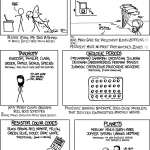Articles in the ‘Beginner’ category Page 39
-
Achieving the impossible by being inspired
Teaching and inspiring are two closely related things. If you can see all superiors as sources of inspiration and knowledge, you will advance faster than if you view them as rivals or opponents. Similarly, realise that you have your own strong sides that inspire other people. Don’t hesitate to teach others if they want to be taught. Inspiration is cyclic in its nature and should flow freely in all directions.
Read → -
Don’t be a tourist if you want to learn Chinese
Immersion abroad can boost language learning, and travelling where the language is spoken can help too. Yet how much you benefit depends on your attitude. To truly learn, stop being a tourist!
Read → -
How to find more time to practise Chinese listening
Listening is probably the most important skill when learning Chinese, and the more you practise, the better. In order to listen as much as you should, you need to stop thinking about listening as a study activity and start thinking about it as a part of life!
Read → -
Growing up in Chinese as a foreign adult
Learning Chinese is in many ways like becoming a child again. That has it’s advantages, but it can also be incredibly frustrating at times. As usual, being aware of the problem is the first step towards solving it. Unfortunately, the only way to handle this particular problem is to adopt a healthy attitude towards it.
Read → -
Using memory aids and mnemonics to make Chinese easier
Remember almost anything is a skill that can be learnt. In fact, some of the methods I talk about in this article have been known for thousands of years. Most mnemonic methods use the power of association to enable us to remember things. In this article, I discuss how we can use this to help us learn Chinese much more efficiently than if we rely on conventional methods.
Read → -
Chinese vocabulary in your pocket
Having vocabulary with you so that you can study anywhere isn’t merely a handy trick, it’s essential. You don’t want to waste high quality time at home in front of your computer doing something you might as well do in the super market queue or while waiting for the bus. Study the right things at the right time!
Read → -
Dealing with tricky vocabulary: Killing leeches
Leeches are words or characters that you keep forgetting and therefore consume much more time than other words or characters. Rather than trying to hammer these words into your brain, a specific strategy is needed to kill the leeches. This article deals with just that, how to handle difficult vocabulary you keep on forgetting.
Read → -
Escaping the convenience trap to learn more Chinese
We like to spend time doing what we’re already good at, which might be a good thing if we’re aiming for excellence in a very narrow field. However, learning a language is not so narrow and requires us ta learn a variety of skills. In this article, I explore the tendency to focus on what we’re already good at and some of it’s negative consequences. I also propose some hands-on tips to escape the convenience trap.
Read → -
Spaced repetition isn’t rote learning
Spaced repetition might on the surface look like it’s rote learning, but I argue that it isn’t. Firstly, spaced repetition isn’t about learning as such. You’re supposed to use smarter methods to learn the words first and then simply review to keep the knowledge fresh. Secondly, spaced repetition won’t degenerate to rote learning if you are alert and avoid cramming of any kind.
Read → -
Goals and motivation for learning Chinese, part 4 – Micro goals
This is the fourth article in my series on goals and motivation. This time the topic is micro goals and how to use them to enhance your studying. In essence, you will need to have goals on many different levels to make sure that you are moving in the right direction. Links to previous articles are presented at the beginning.
Read →








